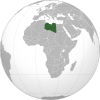
In light of the ongoing battle of citizens against corrupt and unjust regimes throughout the Arab world (more on Wikipedia), protestors have been increasingly reliant on social media websites to rally their numbers and organize their meets.
Over the past two days, protests have flared up considerably in Libya, Yemen, and Bahrain resulting in mass casualties at the hands of government security. We now have reports from friends of NeoSmart Technologies in Tripoli, Libya (stay safe, guys! Please!) that the government has ordered ISPs to block access to most websites. Currently, most websites are unavailable and internet access is, by and large, being blocked.
More importantly perhaps is the fact that the ISPs are actively blocking any attempts to bypass this filtering, with residents in Libya unable to even use the standard filtering bypass tools. We’ve been told that neither OperaTor, HideMyAss, nor HotSpotShield are working. Even standard PPTP VPN connections out of the country are being blocked.
It’s sad to see that fascist dictators can have this sort of control over our everyday freedoms in the online world. We hope that the people will persevere and that sanity will prevent police forces across the Middle East from killing more innocent lives in a desperate bid to stave off the inevitable wave of revolution that is sweeping across the region.
We’ll post updates as we get them.
Update:
While the HotSpot Shield website does not load, the software does in fact work from Libya at the moment. Unfortunately, the same cannot be said for the other VPN/proxy softwares. As such: a mirror for our Libyan friends: download here.
Update:
We’re now being told internet access has been restored. Seems to have been either a trial run or a failed experiment. Let’s hope for the best.
Update:
Nope. It’s being severely restricted once more.

Are Thuraya satellite phones still working over there or jammed?
dankoozy: I’ll ask. Several satellite news stations in the Middle East have been suffering from severe interference all of yesterday. We’re not really sure if Bahrain, Libya, or some other, interested 3rd party is behind the satellite jamming, though.
Lybia is in Africa, not the Middle East. Americans, please learn geography.
Unless of course you consider Africa and Europe as the middle east too ?
Interesting stuff… I hope it doesn’t lead to more deaths than this!
anonymoos: While Libya is technically a North African state (the map above shows this very well) and not part of the geographic Middle East, it and other Islamic or Arab states in the region have long been considered part of the “cultural Middle East,” due to the shared cultural, religious, and lingual traditions across the region.
The Middle East that is commonly referred to contains a lot of African states (even Egypt is technically Africa and not Middle East!) and depending on the mood, skips over certain countries entirely. The Gulf states are pretty far from the Levant, yet they’re definitely considered Middle East territories. And Iran is oftentimes excluded from the typical definition of Middle East though it is nearer than some of the other Arab countries.
And, of course, no one considers Israel to be a Middle Eastern country in the sense that this article is using.
I don’t understand the benefit of shutting down internet. All the bored nerds are left with nothing to do and they get out on the streets shouting slogans. These Generals would never learn. The best idea is to double everyone’s internet speed and announce free Unlimited unmetered bandwidth for everyone for the next 15 days. Half the public would be scrambling to run back home to put the whole Pirate Bay/Red Tube on download. 🙂
After 15 days, rinse and repeat.
It’s really hard to provide reliable internet access when NATO bombers are specifically destroying communication links and infrastructure.
Hi there,
Could you kindly update the link to Hotspot SHield. The correct link should be http://www.hotspotshield.com.
The “www.hotspotshield.com/trial” is a temporary page and we will remove it soon.
Thanks,